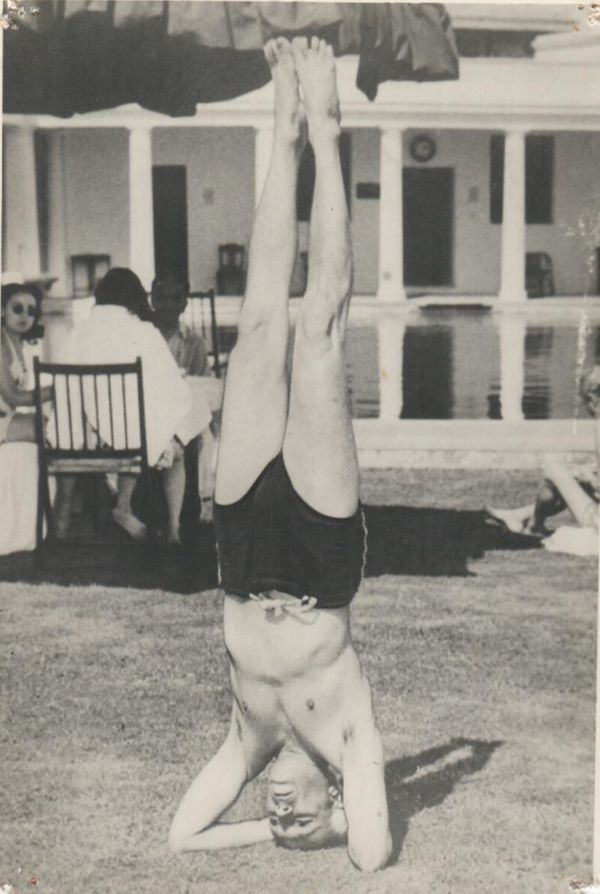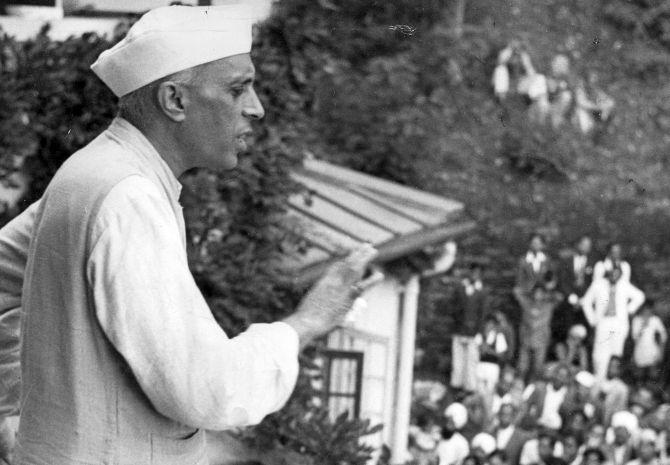'In the first elections, Hindutva forces got only 6% of the votes and won only 10 seats.'
'It was a great defeat for them.'
'They have held that grouse against Nehru since then.'

On Monday, September 24, PTI reported that the Union housing and urban affairs ministry had sent a notice to the Jawaharlal Nehru Memorial Fund to vacate the Teen Murti Bhavan premises even as the Fund denied claims that it was in illegal possession of the property.
The notice was issued following a letter from the director of the Nehru Memorial Museum and Library (NMML), Shakti Sinha, who requested more space for the expansion of the library.
"A notice has been served on the JNMF to vacate the premises of Teen Murti Bhavan by September 24. We are waiting for their reply," a senior official of the ministry told PTI, requesting anonymity.
Established in 1964, the Fund has been located at Teen Murti, once the home of India's first prime minister Jawaharlal Nehru, since 1967. Its offices are not part of the main building but occupy a set of barracks on its eastern side with a separate entry from Teen Murti Marg.
The Fund offers research fellowships to academics from across disciplines, conducts an annual lecture and organises memorial functions.
In addition to these, it has also managed or funded other institutions such as the Jawahar Bal Bhavans for children and Anand Bhavan, the Nehru family's Allahabad home, which now houses a planetarium, an exhibition and organises its own annual functions.
The Fund is chaired by Congress leader Sonia Gandhi and has former Rajya Sabha MP Karan Singh as vice-chairman.
"I had written to the ministry giving them two options. One was to build for us a new building or two, vacate the space given to JNMF. We found out that the allotment process of the JNMF building was not legally sustainable. The entire property belongs to the ministry and they have occupied government property wrongly," Shakti Sinha told PTI.
The Fund's administrators disagree.
Political analyst and the Fund's trustee, Zoya Hasan said the eviction notice was part of attempts to "dilute" the legacy of Nehru.
"A reply has been sent to the ministry stating that there has been no illegal occupation by the JNMF. The organisation has been there for more than 50 years and none has ever questioned its legality," Hasan told PTI.
The letter from the Fund to the ministry, sources said, states that its occupation of the office buildings in the Teen Murti estate is totally legal and duly authorised and has been recognised, accepted and duly permitted all through last several years since 1967 by both the HUA ministry as well as NMML.
It also says that over the years it has worked on several projects along with NMML including setting up the sound and light show and the planetarium which were both donated to NMML, PTI reported on Monday.
Battle lines have been drawn for sometime between the Congress party and the Bharatiya Janata Party over the government's plans for Teen Murti Bhavan.
The Nehru Memorial Museum and Library was set up in Teen Murti Bhavan where some rooms have been preserved as they were at the time of Nehru's death on May 27, 1964.
Media reports said the government was planning to convert the NMML into a museum for all prime ministers.
Former PM Manmohan Singh wrote to Prime Minister Narendra Damodardas Modi that the memorial should not merely be seen as a legacy of the Congress party, but, considering Nehru's immense contributions to the country, it belongs to the entire nation.
Critics of the move to convert it into a prime ministers museum believe the latest step is yet another sign of the BJP's antipathy for Nehru whose legacy it is keen to dismantle.
"Pandit Nehru destroyed the RSS's dream as they thought they had come close to power after Partition and the subsequent riots that followed," Professor Aditya Mukherjee at the Centre for Historical Studies, School of Social Sciences, Jawaharlal Nehru University, tells Rediff.com's Syed Firdaus Ashraf, explaining why the Sangh Parivar has historically been opposed to Nehru and his ideals.
Does the BJP, especially the Modi government, really have so much antipathy for Jawaharlal Nehru as the critics say? If so, why?
Fundamentally, the BJP is against Nehru because he was secular.
Secular to the core.
He was completely opposed to the BJP's (then the BJP's parent, the Bharatiya Jan Sangh) ideology.
Socialism is complete anathema to the BJP.
They (the BJP) are extremely right-wing in economic policies while on the other hand they call themselves as Gandhian socialists.
So, one cannot go by their words as in reality the BJP is anti-Left and supports industrialists.
Now they shout from rooftops that they believe in a Hindu Rashtra, which destroys the entire idea of India.
At the time of Independence, when communal frenzy was at its height, lakhs of people were rendered homeless, murdered.
The RSS at that time, according to Pandit Nehru, was attempting a big coup by capturing power to change the Indian State into a Hindu Rashtra.
Did Nehru mention this anywhere?
Yes.
He wrote this a number of times.
If you read his letters to chief ministers, which are in five volumes, Nehru regularly warned them that the murder of Mahatma Gandhi was not an accident or involved only one person.
What did Nehru do in the first (general) elections in 1951-1952?
He campaigned and made an issue of whether India will be a secular country or be a Hindu counterpart of Pakistan.
He made that first election virtually into a referendum.
He campaigned 40,000 km directly, spoke to 1 out of 10 Indians directly.
Nehru was not alone.
The Congress's secular leadership was very strong at that time.
The result of that election was such that Hindutva forces were pushed back for decades.
In the first elections, Hindutva forces got only 6 per cent of the votes and they won only 10 seats in Parliament.
It was a great defeat for them.
They have held that grouse against Nehru since then.

Did Nehru make an attempt to decimate the RSS in his political career?
(Former prime minister Atal Bihari) Vajpayee said Nehru was a great man who appreciated opposition.
He (Nehru) believed in arguments.
Pandit Nehru never said Hindutva-mukt Bharat.
Why do we see a demonisation of Nehru all the time now, especially on social media?
That is how fascist forces work.
They spread lies, like Nehru's grandfather was a Muslim.
Rumours and lies are their way of life.
Social media makes you feel like puking, as they go on to say he was a womaniser.
They hope that someone will pick up something, and something does get picked up as you keep on repeating the lies.
Another accusation against Nehru is that he gave India dynasty politics.
After Nehru it was Lal Bahadur Shastri who became prime minister.
Nehru did not appoint Indira Gandhi prime minister.
Nehru is also held responsible for the death of Syama Prasad Mookerjee, the founder of the Jan Sangh.
This is a lie.
They also said Nehru killed Subhas Chandra Bose.
There is a limit to how much you can distort history.
They also say that Indira Gandhi must have killed Lal Bahadur Shastri.

How must young Indians look at Nehru in the face of such propaganda?
Nehru must be looked upon as a matter of pride by young Indians.
India is the only post-colonial country which became democratic, and that is largely because of Nehru.
Nehru built democracy in India and it was not an easy thing.
Nehru believed that opposition was very important in democracy.
When he found out that there was not much criticism about him or his work, he, in the fictitious name of Chanakya, wrote articles to criticise himself.
He said what kind of democracy we are having where I am only praised.
He was seen globally as the leader of the Third World.
You go to Latin America or Africa, they will recognise Nehru and Mahatma Gandhi or even Indira Gandhi.
They are household names across the world and we must be proud of them.
What do you think about the RSS's attempt to become an inclusive organisation?
Is this how they become inclusive, by telling lies and taking extreme positions?
I wish they become acceptable.
But they have to change their idea and be moderate.
They have to move forward and not backwards.
Pandit Nehru destroyed the RSS's dream as they thought they had come close to power after Partition and the subsequent riots that followed.
It took them decades to come near power.
It was only half a century later, in the 1990s, that they came to power, so why would they not hate Nehru?
Read Nehru's writings, as he was a sharp critic of communalism.
It is difficult them to attack Gandhi, so they are attacking Nehru.
But now there are attacks even on Gandhi as statues of Nathuram Godse are being raised.
The Mahatma's death brought a sense of guilt in the people who were tilting towards Hindutva.
They realised this is what it leads to.
In his death, Mahatma Gandhi contributed enormously by pushing away communalism.
People could feel that the greatest man of the 20th century died because of identity politics.
Gandhi's death helped a great deal to keep India secular, without a doubt.
You have been using the word 'secular'. But why did Nehru not insert the word into the Constitution, which was only included in 1976 by then prime minister Indira Gandhi?
It was accepted, and not necessary.
If you read the Constitution, it says there will be no discrimination on religion, sex, caste or anything like that.
When the Constitution was written, the voice of non-secular forces was very minor and they were nowhere around.
Why did Hindutva forces not appeal to Hindu society in 1947 as compared to Jinnah's appeal to Muslims?
Till the 1937 elections, the Muslim League got less than 4 per cent of Muslim votes.
It was only in the decade from 1937 to 1947 that Muslim communalism got the full backing from the British State.
Only after that could the Muslim League manage to get a hold over a large number of Muslims.
Even then a large number of Muslims preferred to stay back in India than Pakistan.
Is that not a fact?
The British gave Jinnah a veto by stating that he was representing Muslims.
They said only Jinnah represented Muslims and not Maulana Azad or the Congress party.
So, naturally, the Muslim League was able to grow, especially during the Quit India movement when all the Congress leaders were in jail.
Why weren't the Hindus similarly attracted to Hindutva forces at that time?
They were (attracted), but they were not the dominant force.
Hindus made a distinction between Hindu and Hindutva.
Gandhiji, as Nehru said, was the greatest living Hindu.
Gandhiji was deeply religious. But being a good Hindu does not mean you believe in Hindu communalism.
Maulana Azad was a maluvi and a great believer in Islam.
There was the Deoband School which was very religious, but very secular. They were against the Muslim League of Jinnah.
So what has religion go to do with these issues?
It is politics.











